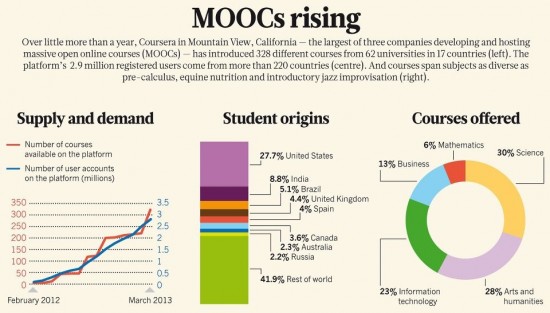Are MOOCs A Game Changer? How Communication Technology is Affecting Education

Massive Open Online Courses (MOOCs) are changing the way students think about education. Through websites such as Coursera, Udacity, or EdX anyone with an internet connection can sign up for a class from different universities free of charge. A professor uploads a series of video lectures, generally between 8 and 15 minutes in length, with short quizzes popping up during the lecture to make sure you are following along. College credit is rarely offered, although you may receive a certificate of completion from the professor.
As these classes become more popular, everyone is trying to figure out if and how they will change our education system. Thomas L. Friedman of the New York Times describes a conference from M.I.T. and Harvard that focused on answering the question, “How can colleges charge $50,000 a year if my kid can learn it all free from massive open online courses?” Many people speculate these courses will best be used in conjunction with the traditional in-class courses, rather than replacing them. Students may watch a lecture at home and then use the classroom time for discussions, questions for the professor, or application of the material (similar to a lab). Some people are wary of the credibility of exams taken online at a massive scale because of how easy it would be to cheat. Coursera uses remote proctoring services to help prevent cheating during exams in classes that are eligible for college credit. Employees of proctoring companies can monitor faraway students via webcams, screen sharing and high-speed Internet connections, checking out their photo IDs, signatures and even their typing styles to be sure the test-taker is the student who registered for the class.
Although this new education trend affects students, the ones who really need to pay attention are the teachers. Professors will need to adapt to a new way of distributing their expertise. With so many courses being offered for free, the competition facing professors is greater than it has ever been. In this new platform where college credit is rarely offered, students are no longer looking to get the best grade. Their focus is to learn the material and they will pick a professor that makes sure that happens.
Simply put, if a lecture is putting you to sleep, you no longer have to suffer through it. Students now have the option of searching for a similar class from a professor who is more charismatic and easy to follow. According to an article in the New York Times, Dr. Stavens of Udacity says that “We reject about 98 percent of faculty who want to teach with us. Just because a person is the world’s most famous economist doesn’t mean they are the best person to teach the subject.” Why? Poor communication skills. MOOCs are challenging professors to hone their presentation skills and to become comfortable with new communications technologies, such as lecturing to a webcam.
Being an effective communicator is becoming increasingly important as communication technology continues to permeate new industries. We hope many of the world’s best professors don’t get left behind.
